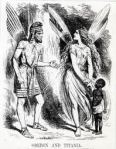A startled Macbeth exclaims, “The Thane of Cawdor Lives! Why do you dress me in borrowed robes?” (1.3.109) as he receives the news that verify the Witches’ prophesy. Shakespeare’s tragedy centers on this valiant warrior, a man whose “o’er riding ambition” brings death to those who surround or oppose him, and a man who brings on his own damnation.
Sound familiar? Well, yes. This is also the plot of the original Netflix production of House of Cards, an American remake of the successful British political mini-series based on a book by Michael Dobbs. In this series, Francis Underwood (Macbeth) played by Kevin Spacey is the calculating Majority Whip of the House of Representatives; Claire Underwood (Lady Macbeth) played by Robin Wright is his conniving wife. Director David Fincher’s mini-series is for educators only with a TV-MA rating, because, “This wicked political drama penetrates the shadowy world of greed, sex, and corruption in modern D.C.” The plot similarities to Shakespeare’s play are not literal, but rather they are in the same desire for the golden round or, in the case of the television series, the American presidency.
Of course, I am not the first to point out these parallels; there are multiple reviewers, bloggers, commenters who have called attention to the Shakespearean qualities in characters and plot line. What I am finding particularly interesting is the inclusion of the many images from the play artfully placed in each episode. For example, Claire’s jarring encounter with the old woman in a graveyard while she was jogging is one. “You should not be here,” the hag appears suddenly warns Claire, “Show some respect here.” The incident resonates much like the specter of the witches, a constant presence in the play. Later, Claire’s $20 handout to a beggar outside a hotel is rejected. The beggar turns the bill into an origami bird, tossing it at Claire’s feet the following day. She leans down and collects up the bird, but that incident pulls Claire into a “spell” of origami folding. Later, Claire is seen neatly folding paper into small figures. The viewer wonders, what was the power of that beggar?
The crimes mount; the murder of a hapless politician, lured into a media trap set up by Francis, is underscored with images of dripping water from a leaky faucet. That same faucet is repaired by Claire, echoing Lady Macbeth’s chilling statement, “A little water clears us of this deed”(2.2.64) Another repeated theme connects Claire to the frightening Lady Macbeth who, in urging Macbeth assassinate the king, declares that if she had a child, she would, ”have pluck’d my nipple from his boneless gums, And dash’d the brains out, had I so sworn as you…” (1.7.16-17). Claire grows obsessed with her childless state, but when she confronts and makes contact with a pregnant adversary, the viewer can positively feel the fetus recoil in horror from the touch.
Additionally, the references to sleep merge the language of Shakespeare and the images from House of Cards. Yes, both Francis and Claire Underwood “sleep around”, but the sleep that is the “balm of hurt minds, great nature’s second course” (2.2.36) is missing. Claire has nightmares, Francis is exhausted. “You look tired,” says she. “I am beat,” says he; they are weary and haunted.
Even the camerawork mimics the framework of the play. Francis delights in engaging the audience in his conspiracies, breaking the fourth wall by delivering his thoughts in folksy soliloquies. His first lines are delivered as he stares into the camera over the body of a dog that has been hit by a car, “There are two kinds of pain. The sort of pain that makes you strong, or useless pain. The sort of pain that’s only suffering. I have no patience for useless things.” He then strangles the dog.
When I teach the play Macbeth, I try to make the characters relevant to my students. I make comparisons to world dictators past and present, I mention mobsters and thugs, I bring up warlords.
I ask my students, “Do you think there are Macbeths today?” “Yes,” they respond, sometimes calling on names from current events.
Unfortunately the rating on House of Cards prevents my sharing this slick contemporary series with my students despite how well the drama picks up the themes and images of Shakespeare’s “Scottish play”. Perhaps that is best; they are not prepared to evaluate this cynical treatment of democracy. The show is an illustration of a ruthless Macbeth, one that Shakespeare would have wanted, a frightening political operative of our time.


















